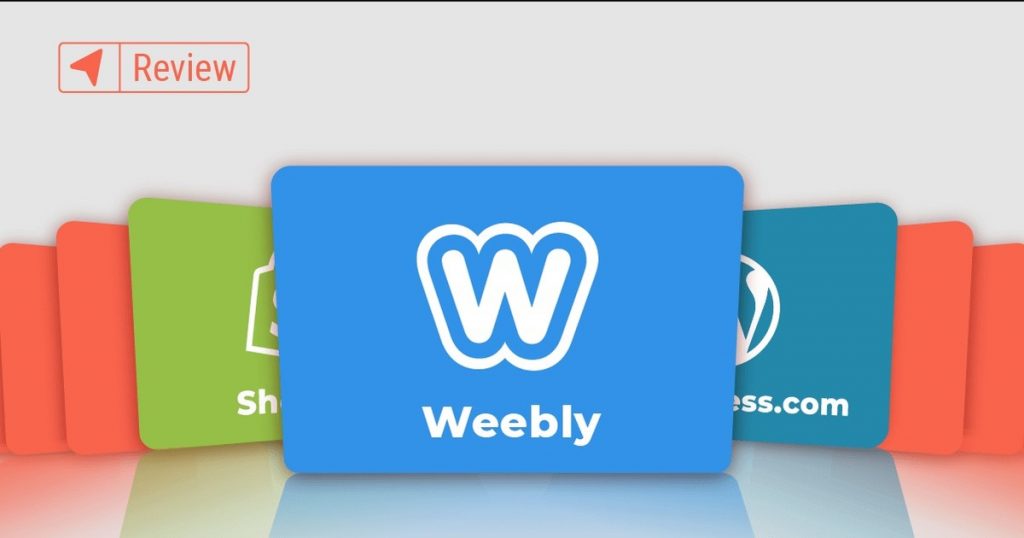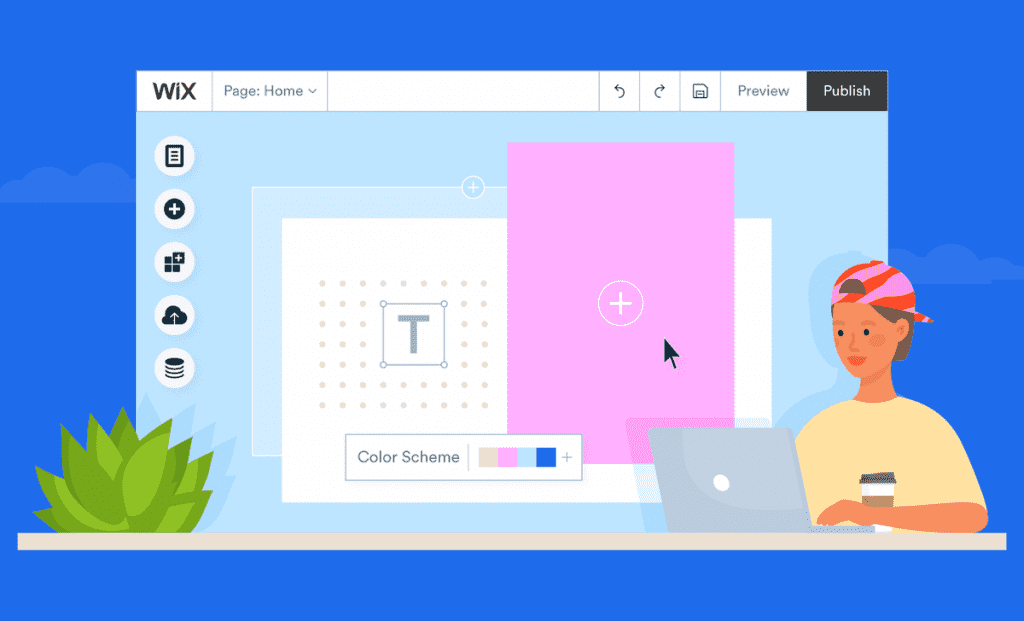Website builders make owning an eCommerce business so easy. Everyone should find their platform of choice to build a highly functional website. But, the decision of which one to choose can be really tough.
By comparing different eCommerce site builders, you are getting valuable insight into their strong sides and eventual weaknesses.
Many features are essential for maintaining a website, including scalability, convenience, eCommerce SEO tools, support, ease of use, and of course, price plans.
For this purpose, we decided to create this Weebly vs Wix comparison by features. Hopefully, the guide will help you decide which one will work better for your business.
Before going any further, let’s give some quick information on both platforms.

Table of Contents
What is Weebly?
Weebly is probably one of the simplest eCommerce site builders. You can quickly assemble the blocks together since the whole process is intuitive and straightforward. Many users say it’s the best value for money because even the free plan has enough useful tools and features.

What Is Wix?
Wix, on the other hand, is a powerful website builder. It gives the users the freedom to assemble a functional and responsive website. It works great as an eCommerce solution.
By comparing Wix vs Weebly, we hope to help you make the right choice. So, here are a few tips:
User-Friendliness and Flexibility
The good thing is that both platforms are created to be user-friendly. That means you can access many functional templates and choose the one that looks best on your website. They are also great for first-time users, who can easily figure out which features they need for eCommerce purposes.
With Weebly, you can simply drag and drop the elements in the editor and ultimately control how your website looks like. That also means you are a little limited, but for entry-level users, it’s an excellent way to start building their site from scratch.
Wix requires more knowledge in web design and development. First, you take a survey to tell your needs and goals, and artificial design intelligence suggests a solution. You can accept it or adjust it more precisely.
So, both builders are user-friendly, but Wix provides more flexibility in this case.
Use of eCommerce Tools and Features
Comparing Weebly vs Wix is not the easiest thing to do because they are pretty different. But, when comparing their eCommerce usability, we can set some things right.
Weebly needs additional tools to adapt the site for eCommerce purposes. After that, you can import your products and incorporate payment options, detailed descriptions, and functional calls to action.
Wix is somehow stronger in the visual representation of the online store. You can zoom the images, watch videos, and pay offline if needed.
So, we can say the result of the Weebly vs. Wix match is tied in this case. Their eCommerce features are quite similar, and you can control every aspect of your new site, no matter the platform.
SEO Implementation
No website can do its magic without a proper SEO strategy implementation. When it comes to Weebly vs Wix SEO tools and features, we must note that both builders come with many functional options you can use to rank your site better.
Using both Wix and Weebly, you can adjust the URLs, change meta tags, and set 301 redirects. But what about headline tags?
Weebly doesn’t perform well when it comes to this thing, so you will have to adjust the headlines with Html tags or even use third-party plugins to help you with that. On the other hand, Wix allows you to adjust the headings from H1 to H6. The overall headline experience is not really smooth for Weebly, and you may have issues formatting the content.
But this doesn’t make Wix the winner here. It also has issues with image names. When you upload an image, it generates some cryptic name, which is not the best SEO practice when it comes to image attributes.
Additionally, both have blogging options, which allow you to furtherly optimize the published content and stand out in the sea of competitors.
But who wins this time? Let’s say that while headings are essential SEO elements, image names take just a fraction of the whole strategy. Also, you will need more search engine optimization tips Weebly in order to create a better SEO strategy. So, we give our points to Wix this time.
More Marketing Features
SEO is just a part of digital marketing strategy. While Wix offers advanced social media and email tools, Weebly is more focused on email marketing. It doesn’t mean you can’t promote your site on social media, but if you want to reach out through email, Weebly would be a more convenient solution.
We can say that in this Weebly vs Wix “fight,” the winner is Weebly. Even though it offers fewer marketing tools and features, email marketing is automated and on point, while you need more work to launch the same campaign using Wix.
Available Customer Support
We can immediately say that this Wix vs. Weebly is a tied match, and now we will explain why.
Both builders offer live chat, online forums, email support, and even phone support. Their social media administrators are always available on Facebook and Twitter, so you can tag them or write a direct message, and they will respond as soon as possible.
The only difference is the navigational part until you find the contact information. Weebly has a separate Contact Us page with all information included. But, if you try to find Wix’s contact details, you will need to check on the FAQs, which can be somehow confusing and frustrating. Once you find that information, you will get a response almost immediately.
Wix vs Weebly Pricing Plans for Everyone
We all know that Weebly is cheaper, but let’s see more of the Weebly pricing vs Wix paid plan. Both offer a free plan with lots of ads, which is not the most convenient choice. If we compare the cheapest Wix vs Weebly pricing plan for ad-free versions, we still find Weebly more affordable.
Price differences grow as you use advanced eCommerce solutions. That means eCommerce plans may come much more expensive for both platforms. For example, Wix business’s basic lowest price is $27 per month, and Weebly professional is $16 per month. Additionally, if you decide to pay for 12 months at once, one Weebly month comes with a more competitive price of $12.
At this point, we must mention that eCommerce features are available in business pricing plans, most of them including customer accounts, payment options, subscriptions, abandoned cart notifications, etc.
Wix vs Weebly – The Verdict
From this Weebly vs Wix comparison, we can see that both site builders are user-friendly, convenient, and great for beginners. If you plan on launching an eCommerce website, you definitely have to take a look at its features and compare them appropriately.
Sometimes it could be pretty challenging to determine the Wix vs. Weebly winner, especially in specific feature groups, like SEO, eCommerce tools, and digital marketing options.
What’s for sure is that both are great for new businesses that need functional yet affordable online store solutions.
How to ensure you won’t make a mistake?
Take your research to the deepest level, exploring guides, reviews, or even Wix vs Weebly reddit threads, until you determine which one to choose. Research is the key, especially when the differences come in tiny details, just like this comparison between two simple and convenient eCommerce solutions.
FAQs
Can I build an eCommerce website using Weebly?
Weebly is one of the simplest web builders to help you build a convenient and functional eCommerce site. Add features as needed, and learn how to overcome some of the SEO limitations, and you won’t have a problem running the online store smoothly.
Is SEO implementation possible with Wix and Weebly?
Both Wix and Weebly offer some basic and advanced SEO features. While Wix has some limitations when it comes to image names, Weebly struggles with heading tags. Luckily, plugins can resolve this issue, so you can implement a complete SEO strategy for your website.
Are Wix and Weebly user-friendly?
Wix and Weebly are among the most user-friendly eCommerce solutions you can find on the market. You can build a complete website using the intuitive approach with little to no knowledge of basic web development. Also, they are easy to maintain, which is a huge plus for both solutions.